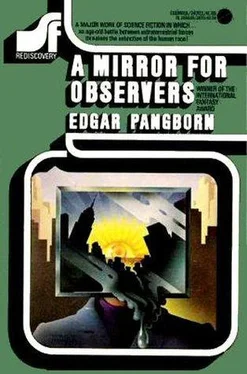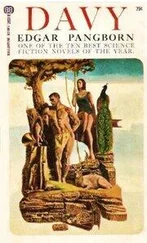I don’t recall much about the ovation they gave her: we were all hysterical. I don’t even remember what all her encores were. There were seven. We let her go at last only because she put on a small comic pantomime of exhaustion.
You could not imagine, Drozma, the first thing she said when she slipped into the Blue River Café, astonishingly small, shy, a mousy gray wrap over her gown — slipped in and knew me somehow through all my changes, caught up the clumsy skirt to run like a child and throw herself at me and bury her snub nose in my shirt. She said: “Ben, I fluffed the Prestissimo, I fluffed it, I went too fast, I scrabbled it — where, where have you been?”
“You never fluffed anything.” I must have muttered more such stuff while we struggled for calm.
We found a booth, with a window overlooking the river and the night. Tranquil and civilized, that restaurant, mild lighting, no fuss, hurry, or noise. It was past eleven o’clock, but they produced a hero-size dinner for Sharon, who admitted to fasting before the concert and now looked with pathetic astonishment at the lobster, saying: “Could I bodaciously have ordered that in my madness?” She ate it though, with all the fixings, and we grinned and mumbled and made groping reaches for the unsayable. Then the lobster was gone, coffee and cognac were with us; Sharon squared her little shoulders and sighed and said: “Now…!”
If there was anything in the nine years I failed to tell her it was either an unavoidable part of our Martian deception or too small to remember. I am “Will Meisel” at present. She found it difficult not to call me Ben. My departure from Latimer had been, in a way, cruel — I knew it at the time. She did not reproach me for it, or for the false message of my death — not directly. But once she took my fingers and pressed them against her cheek and said: “When Mrs. Wilks told me — you see, until Angelo went away I’d never lost anybody — and then you—” But rather than let me flounder and beg forgiveness she went on quickly: “Your hands are the same, just the same. How was it possible to change your face so much? I saw you recognize me, or maybe I’d’ve known you anyway, but—”
With careful vagueness and wholly genuine embarrassment, I lied about having suffered a serious face injury, years before my time in Latimer. I hinted that part of my facial structure was prosthetic, under a successful skin graft, and that I could play tricks with it. I conveyed too that I was sensitive and didn’t like talking of it. “Nine years’ aging too, Sharon, and the white hair is natural.”
“Ben — Will — why was it necessary? But, darling, don’t tell me unless you want to. You’re here. I’ll get used to it sometime….” I told her that my going away had made the police suspect me in connection with the disappearances of Angelo and Feuermann. She confirmed that Feuermann had never been found. My search had to be unhampered, I said, so I juggled personalities and faces, burying an old identity. It was all too far from the human norm and I don’t think it satisfied her, but it was the best I could do. She too remembered Amagoya. She hasn’t a suspicious heart. Sharon at ten had been somewhat sheltered from grown-up speculations and rumors, missing the real and unreal implications of that disaster in Latimer. Music and Mrs. Wilks had held her steady when the loss of Angelo and myself had shaken her world. Soon there had been time, and adolescence. I had foolishly not quite grasped the vast difference between nine of my years and Sharon’s nine between ten and nineteen…. I told her too how I thought Angelo might have been swallowed by the underworld — joined the hobos, something like that — or even suffered amnesia because he felt lost and condemned himself for his mother’s death.
“Why did he mean so much to you?”
“I felt responsible, perhaps. I ought to have kept him out of trouble because I knew he was supernormal and vulnerable, and I didn’t do it.” She wasn’t satisfied. “And I came to think of him as like a son.” There was too much truth in that. “I should have been a better guardian, because I don’t think anyone else saw the dangers.” Not for the first time, she started to ask another question, but held it back, frowning into her cigarette smoke, cherishing my hand. “How well do you remember him, Sharon?”
“I don’t know.” She has developed a number of vivid little mannerisms, none of them posed. A trick of leaning forward suddenly shoving both hands up into her hair and keeping them there, while a tiny frown-crease comes and goes in her smooth forehead; pouting her big sweet mouth without knowing it; smiling so fleetingly you can’t be sure afterward that she smiled at all. “I don’t know. I know that I loved him pretty terribly. Ten years old is such a long time ago, Ben…. Afraid I don’t even know much about the famous male sex. It’s been — you know: technique, not parties — Czerny, not boy friends. And worth it, too — I haven’t minded that.”
“Plenty of time.”
“Oh — time…. I suppose I began to feel he was dead, after Mother Sophia — I’m sort of in the habit of calling her that, she likes it — after she told me that you were. I never forgot him, Ben, I just had to let it go into the past, like a station on a train. I didn’t finish high school, by the way. My mother died when I was thirteen, and Pop remarried — oh well, make way for Cinderella, I couldn’t stand the stepmother and she sure-to-God couldn’t stand me, so Mother Sophia took me to live with her — all I could’ve prayed for. I — hear from Pop now and then. Stiff little letters. Exceedingly grammatical.”
“He wasn’t there tonight?”
“Ah no, he” — her wonderful fingers were gripping my hand hard I again — “he doesn’t get around much, as the jellyfish said to the sea serpent. Means, translated, that while the heller he married runs the store, he goes down to the corner. Got it in all its beauty, darling? He’s Brand Anonymous. And little daughter can no more reach him than — oh, the devil with it. He writes only when he’s sober, about I once in two months, Ben—”
“Will.”
“I’m sorry — Will, Will. I’ve thought so much about Ben …. Well, he wrote that he would like to come to the recital but was very busy and not well. Could be the lady dictated it. She knows he still loves me, in his fashion, that’s her cross. People are so… so…” She gave it up.
We were both silent too long. I said: “Oo ill i owioffsh?”
For some reason that made her cry, but even while she groped impatiently for a handkerchief, and snatched mine, she was saying: “O. Ah ery ush. But I could go another cognac….”
“And Mother Sophia?”
“Splendid.” She was still annoyed at her eyes, wiping them, and repairing make-up. “Immortal — my God, if only she were! I didn’t know what to say, about coming away tonight. Lousy liar. Said I had a whim to be completely alone an hour or so, guess she didn’t mind. She’ll sit up for the press notices and not sleep, so can’t I take you home to see her?”
“Not this time, dear. Later.” I had saved that newspaper photograph, and presently showed it to her. “The man just behind Max, on his left. Remind you of anything?”
“Heck, it almost does.” She held it at different angles, then leaned back, closing the veils on the ocean-blue, opening them widely. “Billy Kell!”
“Just could be. Old Will Meisel has to find out.”
She stared awhile, darkly perplexed, not distrusting me but perhaps hurt by her certainty that I was withholding too much. “Will — what for? Do I sit quiet and play the piano while you butt your head on a stone wall? I have you back just in time to see you get hurt.”
Читать дальше












